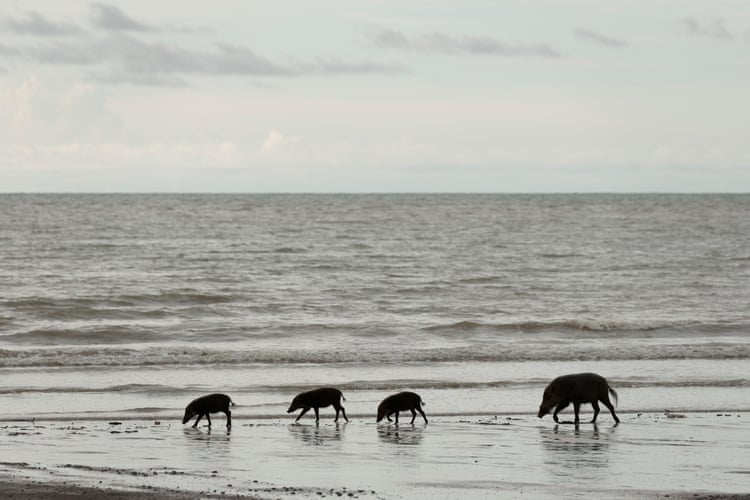[ad_1]
Populations of wild pigs are crashing due to the spread of African swine fever (ASF), threatening the livelihoods of millions who depend on them for food, researchers warn.
With a fatality rate of almost 100%, ASF has swept across Asia, Europe and Africa, devastating domestic and wild pig populations over the past 10 to 20 years. The impacts are especially significant in Borneo, in south-east Asia, where bearded pig numbers have declined by between 90% and 100% since it arrived on the island in 2021, researchers said.
These pigs were once the most common large mammal species on the island, playing an important role as ecosystem engineers, dispersing seeds over large distances, according to a letter published in the journal Science. “These pigs have disappeared,” said Prof Erik Meijaard, the letter’s lead author and former chair of the IUCN Wild Pigs Specialist Group.
“I’ve gone around to everyone doing camera trapping in Borneo, and consistently we’re seeing pigs disappearing. They haven’t seen pigs on camera traps for years,” said Meijaard. He has also monitored seven camera tracking programmes in Malaysia, Indonesia and Brunei, which were not on the island of Borneo, and found their pig populations plummeted in 2019 and 2020. “As soon as [ASF] jumps into a population it eradicates everything,” he said.
Meijaard believes the bearded pig may need to be relisted from vulnerable to critically endangered as a result of ASF. There was no evidence that wild pig populations would fully recover in Borneo or other south-east Asian islands such as Java and Sumatra in Indonesia, Timor-Leste and the Philippines, the scientists said.

In Borneo, the loss of bearded pigs is already having an enormous impact on cultures and communities that depend on them for food. Local studies suggest bearded pigs once accounted for 81% of hunted wildlife by weight in some villages. Now, that number is closer to zero. “It’s a food security issue and a poverty issue. People are just fully dependent on access to wild and feral pigs for their protein needs,” said Meijaard.
The disappearance of this key protein source puts pressure on other species: in the absence of pigs, millions of local people were likely to shift their focus to hunting endangered species such as pig-tailed macaques, the scientists warned.
The loss of wild pigs can also affect the ecosystem as a whole. Bearded pigs disperse the seeds of trees as they eat fruits and migrate large distances, defecating them out throughout the forest. They also turn over soil with their snouts, which cleans undergrowth and gives tree roots access to more soil nutrients. The forests of Borneo are among the world’s most diverse ecosystems, but only 50% remain as a result of decades of logging and expansion of farmland, particularly palm oil plantations.
The scientists called for urgent research and interventions, while acknowledging the impacts on communities. The focus should be urgently to prevent the spread of ASF to other regions, the letter recommended.
“Although African swine fever has garnered substantial attention in countries with major pork industries, its effects in Borneo have been largely overlooked,” researchers wrote. “The loss of pigs disrupts food security and ecosystems and threatens other endangered wildlife.”
Trials for creating an effective vaccine have showed positive results, but this would be more effective for domestic pigs. Vaccinating wild pigs would be “logistically hugely complex and expensive to implement”, said Prof Benoit Goossens from Cardiff University, another author of the letter.
James Wood, an epidemiologist from the University of Cambridge, who was not involved in the letter, said it raised important questions about the global narrative of wild pigs being vectors of disease, and therefore a threat to the domestic pig industry. He said: “The authors describe, in contrast, how wild pig species, which in Borneo and other south-east Asian islands are central to both the culture and nutrition of many different peoples, are being devastated by ASF virus, which has been spread around the world by human-mediated movement of pigs and pig products.
“All efforts should be made to prevent the further spread of ASF between south-east Asian islands, in particular through trade in pigs and pig products, as the effects there can be far worse than just in the swine industry.”
Dr Harriet Bartlett from University of Oxford, who was not involved in the paper, agreed that the effects of the disease had been focused on the pig industry. “Expanding our focus beyond the immediate economic concerns to include the broader ecological and societal implications will be important to effectively address ASF,” she said.
This article by Phoebe Weston was first published by The Guardian on 19 January 2024. Lead Image: A bearded pig on Borneo where numbers have declined by 90% to 100% since African swine fever arrived on the island in 2021. Photograph: John Sullivan/Alamy.
What you can do
Help to save wildlife by donating as little as $1 – It only takes a minute.
[ad_2]
Source link

Leave a Reply